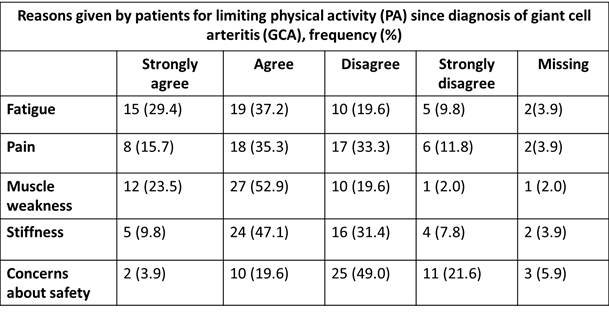Session Information
Date: Monday, November 9, 2015
Title: Vasculitis Poster II
Session Type: ACR Poster Session B
Session Time: 9:00AM-11:00AM
Background/Purpose: Physical
inactivity is the fourth leading risk factor for global mortality accounting
for 6% of deaths. Patients with giant cell arteritis (GCA) are at increased
risk of cardiovascular disease and psychological stress due to GCA and its treatment
(typically high dose glucocorticoids), which may be helped by introducing or
maintaining regular physical activity (PA). According to the 2011 United
Kingdom Department of Health guidance on physical activity for all adults,
including those with a chronic disease, adults should be
exercising every day and adults should perform moderate physical activity totaling
≥2.5 hours per week or perform vigorous physical activity totaling ≥75
minutes per week. We hypothesise that patients
are not meeting these guidelines.
Methods: We
collected information on demographics and presenting features from hospital
records of recently diagnosed patients with GCA. We carried
out a postal survey including: the Standardised International
Physical Activity Questionnaire (IPAQ) and a questionnaire to identify any barriers
to participation in PA and to ask about any advice given to patients regarding PA
(from healthcare professionals, family and friends). We compared patient participation
in exercise with the 2011 guidelines on physical activity.
Results: The response rate was 51/102. Responding participants
had a mean age (SD) of 73.6 years (7.3) and 33 [64.7%] were female. The median
time from diagnosis of GCA was 17.5 months [interquartile range (IQR) 11-28
months], median CRP before steroids was 30 mg/l [IQR 10-87]. Presenting
features included headache (74.5%), polymyalgia rheumatica (51.0%), transient
visual loss (21.6%), permanent visual loss (5.9%) and stroke (3.9%). Twenty
two (43.1%) patients reported walking for >10 minutes per day, 7 (13.7%) reported
moderate PA and 1 (2.0%) reported vigorous daily PA. Eleven (21.6%) performed
≥2.5 hours/week of moderate PA including 1 patient reporting ≥75
minutes of vigorous PA per week. Reasons for limiting their physical activity included:
muscle weakness (53%), stiffness (49%), fatigue (37%) and pain (37%). 23.5% had
concerns about the safety of exercise. Patients recalled being given advice
about physical activity by general practitioners (33.3%), rheumatologists (37.2%),
family or friends (45.1% and physiotherapists (23.5%). Conclusion: Physical
activity has the potential to improve musculoskeletal, cardiovascular and
mental health problems in patients with GCA receiving high dose glucocorticoids,
but only 21.6 % of patients met national UK guidance on total duration of physical
activity. Only 33.3 % patients received exercise advice from their GP and 37.2%
from their rheumatologist. Further work is needed to explore the safety and
benefits of physical activity in GCA.
To cite this abstract in AMA style:
Robson J, Lada K, Miller A, Williamson W, Newton J, Luqmani R. Do Patients with Giant Cell Arteritis Meet the 2011 United Kingdom Department of Health Guidance on Physical Activity? [abstract]. Arthritis Rheumatol. 2015; 67 (suppl 10). https://acrabstracts.org/abstract/do-patients-with-giant-cell-arteritis-meet-the-2011-united-kingdom-department-of-health-guidance-on-physical-activity/. Accessed .« Back to 2015 ACR/ARHP Annual Meeting
ACR Meeting Abstracts - https://acrabstracts.org/abstract/do-patients-with-giant-cell-arteritis-meet-the-2011-united-kingdom-department-of-health-guidance-on-physical-activity/

